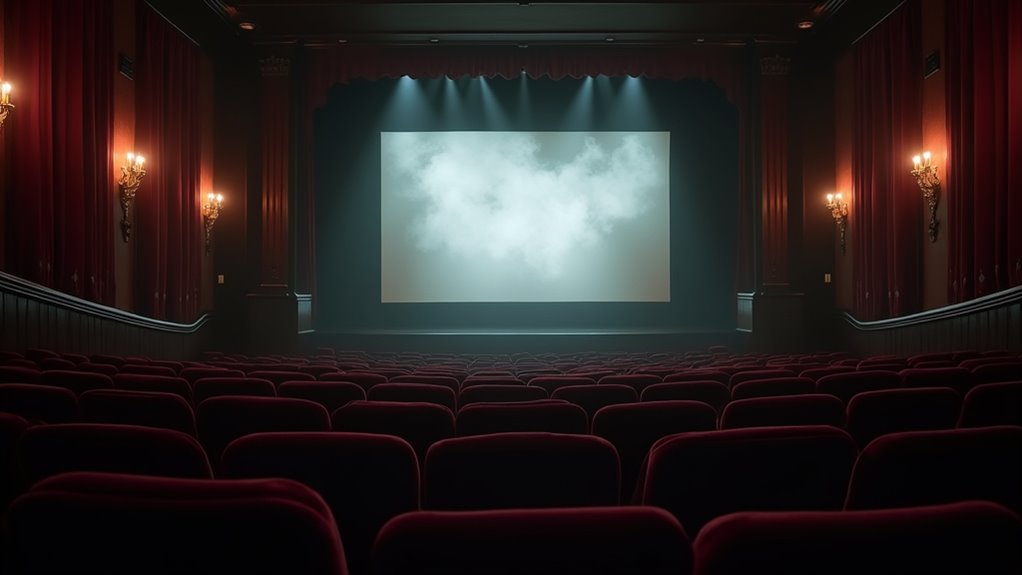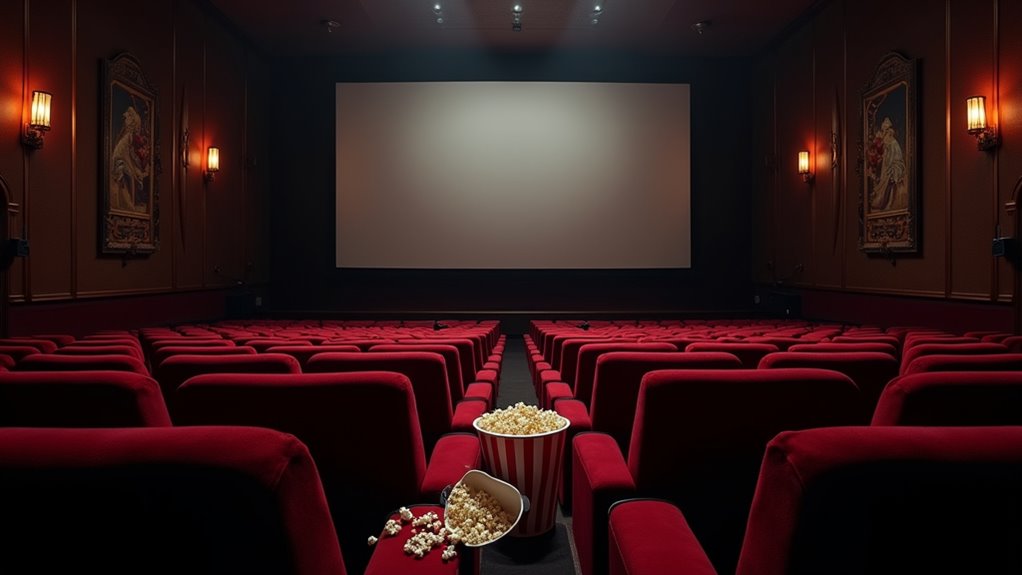Landmark thrillers like Hitchcock’s “Psycho” and Fincher’s “Se7en” have mastered the art of keeping audiences breathless through psychological manipulation and innovative storytelling. Modern masterpieces such as “Get Out” and South Korea’s “Memories of Murder” continue this tradition, blending social commentary with nail-biting suspense. From the shower scene that changed horror forever to complex narratives that challenge perceptions, these films showcase how the genre expertly plays with tension, fear, and anticipation to create unforgettable viewing experiences.
The Evolution of Thriller Movies: From Classic to Contemporary

While the thriller genre has become a cornerstone of modern cinema, its roots can be traced back to the silent film era of the 1920s, when pioneering directors first experimented with building tension through visual storytelling.
From Harold Lloyd’s death-defying stunts in “Safety Last” to Hitchcock’s groundbreaking “The Lodger,” these early films laid the foundation for what would become one of film’s most enduring genres.
Early thrillers redefined cinema through daring physical feats and suspenseful narratives, paving the way for generations of filmmakers to follow.
Directors focused heavily on creating suspense and anxiety through innovative techniques that would keep audiences guessing until the very end.
The introduction of technicolor in the late 1940s revolutionized the thriller, with Hitchcock leading the charge through masterpieces like “Rope” and “Rear Window.”
The 1970s marked another evolution as directors like Spielberg and Coppola pushed boundaries with gritty realism in films like “Duel” and “The Conversation.” The decade also saw the emergence of horror hybrids, blending psychological tension with more graphic elements.
Today’s thrillers have expanded beyond traditional formulas, incorporating elements from various genres, as seen in the mind-bending “Inception” and the socially conscious “Parasite,” proving the genre’s remarkable adaptability and staying power in contemporary cinema.
Must-Watch Psychological Thrillers That Define the Genre
When exploring the pantheon of psychological thrillers that have shaped modern cinema, certain films stand out as masterful examples of the genre’s ability to burrow deep into viewers’ psyches.
From Hitchcock’s groundbreaking “Psycho,” with its infamous shower scene that changed horror forever, to the mind-bending narrative of “Memento,” these films have consistently pushed the boundaries of storytelling and psychological manipulation. Se7en exemplifies this tradition with its exploration of seven deadly sins through its methodical killer’s horrific crimes. The innovative use of reverse chronology in Memento places viewers directly in the protagonist’s fractured mind.
The genre’s evolution has produced remarkable standouts like “The Silence of the Lambs,” where Anthony Hopkins’ chilling portrayal of Hannibal Lecter redefined the psychological antagonist, and “Black Swan,” which turned the pristine world of ballet into a descent into madness.
More recent entries like “Get Out” have brilliantly merged social commentary with psychological terror, while films like “Watcher” demonstrate how subtle tension and mounting paranoia can be just as effective as overt scares.
These movies don’t just thrill – they leave lasting impressions that haunt viewers long after the credits roll.
Global Masterpieces: International Thriller Films Worth Your Time

As Hollywood continues to dominate global cinema, a remarkable collection of international thrillers has emerged to challenge American supremacy in the genre. South Korean filmmakers, in particular, have mastered the art of psychological tension, with Park Chan-wook’s “Oldboy” and Bong Joon-ho’s “Memories of Murder” setting new standards for complex narratives and haunting character studies. The prestigious film won the Best Foreign Film Oscar and helped establish South Korean cinema’s global reputation.
These international masterpieces often tackle deeper societal issues while maintaining edge-of-your-seat suspense. “Burning” explores class divisions in modern South Korea, while Spain’s “The Invisible Guest” proves so compelling it spawned six international remakes. Similar to The Girl with the Dragon Tattoo, these films feature strong female leads who challenge societal norms through powerful performances.
Kim Jee-woon’s “I Saw the Devil” pushes boundaries with its dark exploration of revenge and moral ambiguity, proving that sometimes the most gripping thrillers come with subtitles.
Directors like Bong Joon-ho and Park Chan-wook have perfected the art of blending cultural commentary with nail-biting suspense, creating films that transcend language barriers while keeping audiences guessing until the final frame.
Frequently Asked Questions
What Are the Best Thriller Movies to Watch With Kids?
For younger viewers, “Hotel Transylvania” and “Scooby-Doo” offer spooky fun without nightmare fuel, while tweens can graduate to “Super 8” and “Coraline” for more substantial thrills.
Older kids ready for genuine scares might appreciate “Scary Stories to Tell in the Dark” or “Gremlins,” which balance tension with humor.
“Spirited Away” provides a masterclass in atmospheric storytelling, proving that family-friendly thrillers don’t need gore to captivate.
How Do Directors Create Suspense Without Relying on Jump Scares?
Directors create suspense through strategic cinematography, carefully controlling the flow of information to audiences.
They employ techniques like slow camera movements that suggest impending danger, purposeful lighting that creates ominous shadows, and layered sound design that builds tension.
Rather than cheap scares, masters of suspense like Hitchcock relied on psychological manipulation, revealing just enough detail to keep viewers anxiously anticipating what might happen next.
Which Thriller Movies Are Based on True Crime Stories?
Several acclaimed thrillers draw directly from true crime cases, including “Zodiac,” which chronicles the hunt for the notorious 1960s Bay Area killer, and “Monster,” depicting Aileen Wuornos’s tragic story.
“The Frozen Ground” portrays Robert Hansen’s Alaska murders, while “Extremely Wicked, Shockingly Evil and Vile” examines Ted Bundy through his girlfriend’s perspective.
Recent additions like “The Good Nurse” expose Charles Cullen’s hospital killing spree, adding to this chilling subgenre.
What Makes a Thriller Different From a Horror Movie?
Thrillers and horror movies diverge primarily in their approach to audience engagement and storytelling techniques.
While horror films aim to terrify through supernatural elements and gore, thrillers focus on psychological tension and complex mysteries that challenge viewers intellectually.
Thrillers typically feature resourceful protagonists engaging in battles of wit against adversaries, whereas horror emphasizes victimization and survival.
The pacing also differs significantly, with thrillers maintaining suspense through strategic plot development rather than shock value.
Why Do so Many Thrillers Take Place in Isolated Locations?
Isolated locations serve as perfect pressure cookers for thriller narratives, forcing characters to confront their fears with nowhere to run.
These remote settings, whether a cabin in the woods or a deserted island, naturally amplify tension by removing safety nets and outside help.
The isolation also allows filmmakers to deeply explore character psychology and relationships while building suspense through environmental threats and limited resources, creating a more focused and intense viewing experience.
